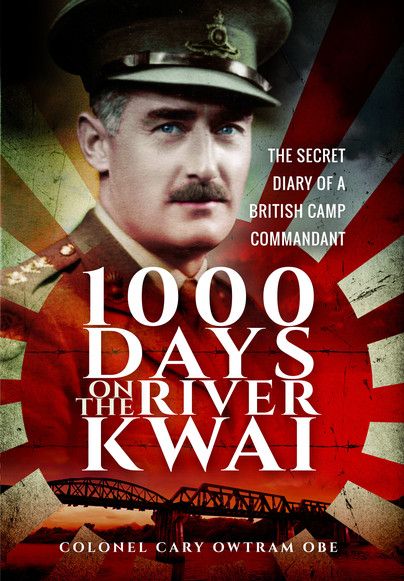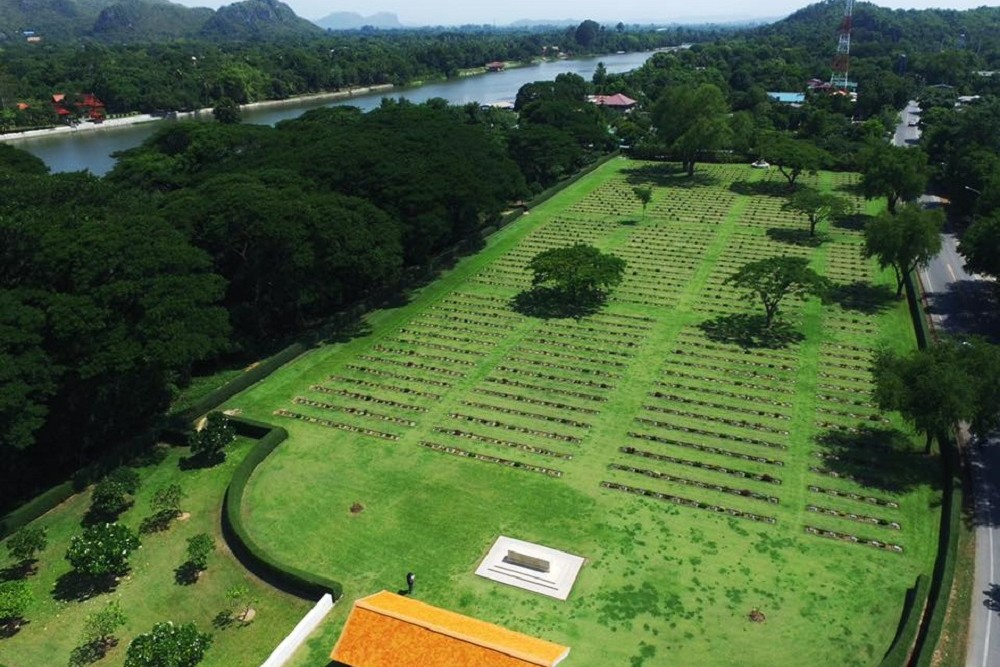| Title: | 1000 Days on the River Kwai |
| Subtitle: | The secret diary of a British camp commandant |
| Author: | Colonel Cary Owtram Obe |
| Publisher: | Pen & Sword |
| Published: | 2017 |
| Pages: | 152 |
| Language: | English |
| ISBN: | 9781473897809 |
| Review: |
In 1942 the Japanese were engaged in a push and the Imperial Army had already conquered large parts of Asia. It was to be expected that the push would advance into Singapore and its surroundings, which were still in British hands. Meanwhile, the British Prime Minister Winston Churchill had transferred the gold and silver reserves from Hong Kong and Singapore to a safer haven and sent last minute military reinforcements to Singapore. These British troops arrived when the Japanese crossed the border to Malaysia. The British were immediately sent to the front to stop the Japanese invasion of Malakka and Singapore. The 137th Field Regiment Royal Artillery led by commandant colonel Cary Owtram was part of the reinforcement. The British lost the battle and had to surrender. A period of long captivity followed in which colonel Owtram kept a secret diary, which he kept well hidden, and after the capitulation of Japan (partly as a result of the atom bombings on Hiroshima and Nagasaki) raked up again. This diary formed the basis for this story: ‘1000 Days on the River Kwai’. After he became a POW in and was transported to the infamous Burma railway, colonel Cary Owtram was appointed as Camp Commander in Chungkai (Thailand), one of the larges prisoner of war camps, in which amongst others also Americans, Australians and Dutch prisoners were incarcerated. Over the years, as much as 30,000 were held prisoner here. As commandant of all the British, Australian, American and Dutch POWs he had the severe responsibility for those under his leadership and had to deal with the daily trauma of dealing with the unpredictable Japanese. Despite the efforts of military doctors to keep the prisoners alive, many of the thousands of prisoners died, due to the primitive circumstances in the camp. Colonel Cary Owtram had to maintain order and discipline and also had to run a hospital. They had to facilitate and finance all medication and other affairs themselves. Doing business with the locals under the unpredictable Japanese regime was extremely dangerous. The food was also of extreme poor quality, hence why the POWs lost weight and were weakened. The weather – extreme rainfall and tropical temperatures – combined with the heavy work to the railway, caused many prisoners to die. During his captivity, his family had little contact with Cary and receive little news about his wellbeing. Mail arrived seldom or only after a year. After the war he hardly talked about his experiences. He made notes during his captivity, which he burried. After the Japanese capitulation he was able to dig up the notes and take them with him. He rewrote his diary in 1953. After the war he remained a soldier and actively interfered with politics and was socially active. That captivity had left a lasting impression became evident after he woke up after being anaesthetized after an operation. He was under the impression that he was back in the POW camp Chungkai, where he had been anaesthetized also. His family only found this out at a later date. The former colonel also hated everything Japanese for the rest of his life. Cary was commemorated for his acts as POW commandant: Officer of the Order of the British Empire, hence the abbreviation OBE after his name. After his death in 1993, his daughters went to a great deal to get their dad’s diary published. They succeeded in 2016 with publishing company Pen & Sword. This book is equal to the updated book from 1953, but some texts were formulated differently. Now, many years after the war, a reconciliation process is taking place and some – with due respect to the feelings and experiences of the writer – of the expressions and terms of abuse used during captivity, such as ‘nips’ for Japanese, are no longer common or desirable. Many former POWs provided testimonies to the way in which Cary Owtram protected them against the terrible ordeals they had to suffer from the guards and the courage Owtran displayed. A letter describing his courage is included at the end of the book. That Cary has made a lasting impression on people is also evident when one of his daughters visits the camp area in the 1960s in her capacity as a BBC TV producer. The camp site was overgrown and desolated and hardly recognisable as such. As a coincidence she met a local merchant who remembered her dad, even after all those years. The merchant had supplied him and other prisoners with goods. The diary of Colonel Cary Owtram published by Pen & Sword is an easy to read book that gives a good impression of the many hardships suffered by the many POWs in Asia. The photos in the book also paint the picture. |
| Rating: |
Information
- Article by:
- STIWOT translator
- Article by:
- Wijnand de Gelder
- Published on:
- 23-09-2017
- Feedback?
- Send it!





